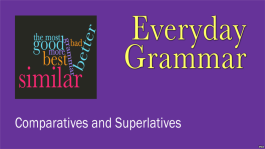The teachers at Wadsworth Elementary School attempted to ingrain the laws of grammar into the minds of my classmates. We memorized language rules by rote and then learned the exceptions to every rule. While writing, I still find myself mumbling arcane, grammatical incantations like: “I before E except after C unless followed by ‘eigh’ as in neighbor or weigh.”
Language experts state that English is one of the most difficult languages to master. Think about it—American children spend twelve years in school learning how to read and write a language in which they are naturally fluent!
 One of the trickier rules of English grammar concerns comparisons. According to Wikipidia.com, “Comparison, in grammar, is a property of adjectives and adverbs in most languages; it describes systems that distinguish the degree to which the modifier modifies its complement.” So there you go.
One of the trickier rules of English grammar concerns comparisons. According to Wikipidia.com, “Comparison, in grammar, is a property of adjectives and adverbs in most languages; it describes systems that distinguish the degree to which the modifier modifies its complement.” So there you go.
Comparisons are made in one of two main ways. Words with less than three syllables typically use the suffix –er for comparisions and –est for superlatives. For example, “John is taller than Juan” or “Susie is the fastest person in her class.”
Words with three or more syllables are normally preceded by “more” or “most.” For example, “Sean is more productive than Jean” or “Katie is the most prolific writer in her school.”
Back in the day, our teachers taught us that words with one or two syllables use the suffix –er or –est; and words with three or more syllables use more or most. Today’s grammaticians are a more wishy-washy group who ambigiously mumble that words with two syllables can go either way.
One site advised that –er or –est should be used unless the new word sounds awkward. Well, THAT clears things up.
 I confess to being a bit of a grammar geek and often critique miscues in grammar and spelling. One of my pet peeves is the incorrect use of comparisons. A recent commercial on TV for a public utility invited people to become “More Cool.” Memo to the advertisers: it should read “Cooler.”
I confess to being a bit of a grammar geek and often critique miscues in grammar and spelling. One of my pet peeves is the incorrect use of comparisons. A recent commercial on TV for a public utility invited people to become “More Cool.” Memo to the advertisers: it should read “Cooler.”
Others creatively combine comparisons. I heard a weather reporter describing how an approaching front might be “more stormier.”
English is such a complicated language that there are always exceptions to every rule. Comparisons have a subgroup of irregular words that march to the beat of their own drummers. Common examples include: good (better and best), many (more and most), and bad (worse and worst).
Another group called “absolute adjectives” supersede any comparison. Consider words such as “perfect” or “unique.” By definition, nothing can be more perfect than something already perfect. If someone is unique, then another person cannot be uniquer. Although I will note that the spell checker on my word processing software did not flag “uniquer.”
So be carefuler in your comparisons and more rightest in your superlatives. Otherwise, you might just end up looking like the most foolishest one of aller!

Thank you, Bill! Glad to know I’m not the onliest one.
LikeLike
And I also! The incorrect use of “I” and “me,” as well as “she” and “her,” etc., bug me. We could blame my mother as well as my teachers, but I don’t wish to blame anyone…I thank them! And thank you for writing on this subject, Bill!
LikeLike
It’s important to know grammar good! 🙂
LikeLike
May and can grab me when used incorrectly.
LikeLike
As a word-smith you reign supreme and I so enjoyed this blog post. Hope I never give the grammatically correct amongst us reason to cringe!
LikeLike
Remember Andy Rooney’s “You know what bothers me?” Well, yup write of things that bother me. I have recovered for the most part, but I used to challenge just about everyone’s grammar, which comes with a degree of caution because of likely counter attack. Now, I keep the challenges to myself, as just about anything goes with our relaxed society. What I cannot release, though, is the use of towards for toward. (This can also apply to the words forward, upward, and backward.) Whenever I hear someone use the “plural” form, I mentally shout the “singular” form and wonder why I ever worked to earn a degree in such a battered language as English! Of course, apparently, both forms are correct. That speaks volumes about our “everything is acceptable” culture. I have learned to be tolerant. Thank the Lord for helping me to look upwards and move forwards in this backwards world!
LikeLike
AND The weird foreigner seizes neither leisure nor sport at its height. AND protein and heifer
LikeLike
Thanks Bill for sharing this blog. It brings to mind my English teacher.
LikeLike